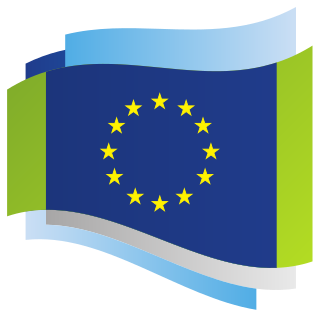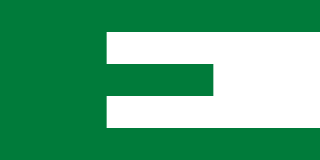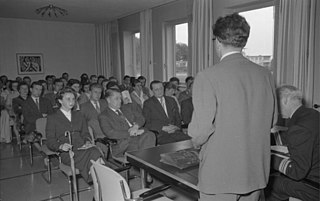Related Research Articles

The European Council is a collegiate body that defines the overall political direction and priorities of the European Union. It is composed of the heads of state or government of the EU member states, the President of the European Council, and the President of the European Commission. The High Representative of the Union for Foreign Affairs and Security Policy also takes part in its meetings.

The European Commission (EC) is the executive of the European Union (EU). It operates as a cabinet government, with 27 members of the Commission headed by a President. It includes an administrative body of about 32,000 European civil servants. The Commission is divided into departments known as Directorates-General (DGs) that can be likened to departments or ministries each headed by a Director-General who is responsible to a Commissioner.

The federalisation of the European Union describes processes and proposals by which the European Union (EU) could be transformed from an informal confederation into a federation. There is ongoing discussion about the extent to which the EU has already become a federation over the course of decades, and more importantly, to what degree it should continue to evolve into a federalist direction. As of October 2022, the EU has no formal plans to become a federation.

The Treaty of Rome, or EEC Treaty, brought about the creation of the European Economic Community (EEC), the best known of the European Communities (EC). The treaty was signed on 25 March 1957 by Belgium, France, Italy, Luxembourg, the Netherlands and West Germany, and it came into force on 1 January 1958. Originally the "Treaty establishing the European Economic Community", and now continuing under the name "Treaty on the Functioning of the European Union", it remains one of the two most important treaties in what is now the European Union (EU).
European integration is the process of industrial, economic, political, legal, social, and cultural integration of states wholly or partially in Europe or nearby. European integration has primarily come about through the European Union (EU) and its policies.

The European Movement International is a lobbying association that coordinates the efforts of associations and national councils with the goal of promoting European integration, and disseminating information about it.

The institutions of the European Union are the seven principal decision-making bodies of the European Union and the Euratom. They are, as listed in Article 13 of the Treaty on European Union:

The European Defence Agency (EDA) is an agency of the European Union (EU) that promotes and facilitates integration between member states within the EU's Common Security and Defence Policy (CSDP). The EDA is headed by the High Representative (HR/VP), and reports to the Council. The EDA was established on 12 July 2004 and is based in the Kortenberg building in Brussels, Belgium, along with a number of other CSDP bodies.

Monica Frassoni is an Italian politician who served as a Member of the European Parliament from 1999 to 2009 and as co-chair of the European Green Party from 2009 to 2019. In 2018, she was elected at the local Council of Ixelles in the Brussels Region, representing the Ecolo party.

The Union of European Federalists (UEF) is a European non-governmental organisation, campaigning for a Federal Europe. It consists of 20 constituent organisations and it has been active at the European, national and local levels since 1946.

Young European Federalists is a political youth organisation. Active in most European countries, it seeks to promote European integration through the strengthening and democratisation of the European Union (EU). JEF has close ties to the European Movement and the Union of European Federalists and is a full member of the European Youth Forum (YFJ).

Altiero Spinelli was an Italian communist politician, political theorist and European federalist, referred to as one of the founding fathers of the European Union.

The year 1948 marked the beginning of the institutionalised modern European integration. With the start of the Cold War, the Treaty of Brussels was signed in 1948 establishing the Western Union (WU) as the first organisation. In the same year, the International Authority for the Ruhr and the Organization for European Economic Co-operation, the predecessor of the OECD, were also founded, followed in 1949 by the Council of Europe, and in 1951 by the European Coal and Steel Community, with the ensuing moves to create further communities leading to the Treaty of Rome (1957)

The United States of Europe (USE), also known as the Federal States of Europe (FSE), the European State, the European Superstate, the European Federation and Federal Europe, is the hypothetical scenario of a sovereign superstate in Europe, organised as a federation of the member countries of the European Union (EU), as contemplated by political scientists, politicians, geographers, historians, futurologists and fiction writers. At present, while the EU is not a federation, various academic observers regard it as having some of the characteristics of a federal system.

The European Union (EU) uses a number of symbols, including the Flag of Europe, Anthem of Europe, Motto of the European Union and Europe Day.

The Spinelli Group is an initiative founded with a view to reinvigorate the endeavour for federalisation of the European Union (EU), by creating a network of citizens, think tanks, NGOs, academics, writers and politicians who support the idea of a federal and united Europe. Among other goals, the Group aims to "find a federal majority [among members of the European Parliament] on important subjects." Founded on 15 September 2010 in the European Parliament (EP) in Brussels, the group is named after Altiero Spinelli (1907–1986), founder of the Union of European Federalists (UEF) and a founding father of the European integration.

The European Federalist Party is a European political party founded on 6 November 2011 in Paris. The EFP is one of the first European-oriented political parties that openly defends European federalism and is not a coalition of pre-existing national parties.

Europa-Union Deutschland e.V. (EUD) is the German section of the Union of European Federalists (UEF). It is a non-partisan, interdenominational and independent non-governmental organization advocating federal Europe. EUD's youth organization, Junge Europäische Föderalisten Deutschland is part of the Young European Federalists.

Volt Europa is a pro-European and European federalist political movement that also serves as the pan-European structure for subsidiary parties in several EU member states. Volt candidates stood on a common, pan-European manifesto in eight member states at the European Parliament elections in May 2019. The organisation follows a "pan-European approach" in many policy fields such as climate change, migration, economic inequality, international conflict, terrorism and the impact of the technological revolution on the labour market. The party endorses "evidence-based policy" and the sharing of best practice between EU member states.

The European Schools is an intergovernmental organisation, which has established, finances, and administers a small group of multilingual international schools, bearing the title "European School", which exist primarily to offer an education to the children of European Union (EU) staff; offers accreditation to other schools, bearing the title "Accredited European School", under national jurisdiction within EU member states to provide its curriculum; and oversees the provision of the secondary school leaving diploma, the European Baccalaureate.
References
- ↑ Self-description on Stand Up for Europe's website.
- 1 2 3 4 "The pro-Europe grassroots movements aimed at saving the EU". Deutsche Welle. 1 April 2017. Retrieved 12 May 2017.
- ↑ "Emmanuel Macron, une opportunité pour réinventer l'Europe". Libération (in French). 9 May 2017. Retrieved 12 May 2017.
- ↑ "Regioni europee convocano i movimenti pro-Ue a Bruxelles". Agenzia Nazionale Stampa Associata (in Italian). 4 May 2017. Retrieved 12 May 2017.
- ↑ Statutes of Stand Up for Europe (22 February 2017).
- ↑ David Zühlke (16 December 2016). "Föderalisten bündeln Kräfte: Stand up for Europe". Treffpunkt Europa (in German). Retrieved 12 May 2017.